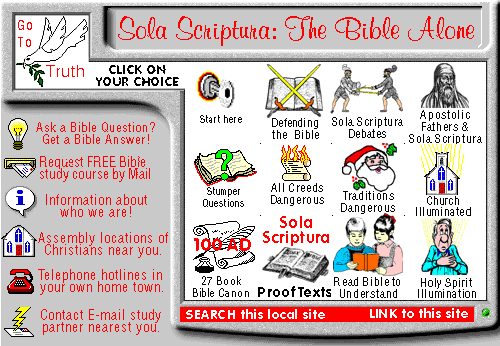Sola Scriptura: The illumination of the church by the Holy Spirit to correctly interpret the Bible is false doctrine!
Illumination of the Church by the Holy Spirit to understand the Bible is a false doctrine and contrary to "sola Scriptura": Most Protestants are as bad a Catholics and Orthodox in holding to this destructive and deceptive doctrine.
The Holy Spirit gave us the Bible and we can understand it as any other book. Why can we understand newspapers, but not the Bible without the Holy Spirit? This false doctrine makes God incapable of writing to be understood, while men can be understood in the newspaper. It also makes all books on earth understandable without the Holy Spirit, except for the Bible, which we are, according to this false doctrine, prevented from understanding until the Holy Spirit illuminates the meaning for us!
|

|
The illumination of the church by the Holy Spirit to correctly interpret the Bible is false doctrine! |
Sola Scriptura home page
 The church is not an infallible interpreter of scripture!
The church is not an infallible interpreter of scripture!
I. Oral Traditionalists: Roman Catholic and Orthodox churches
"But the appeal to antiquity is both a treason and a heresy. It is a treason because it rejects the Divine voice of the Church at this hour, and a heresy because it denies that voice to be Divine. How can we know what antiquity was except through the Church? ... I may say in strict truth that the Church has no antiquity. It rests upon its own supernatural and perpetual consciousness. ... The only Divine evidence to us of what was primitive is the witness and voice of the Church at this hour." (Henry Edward Manning, The Temporal Mission of the Holy Ghost: Or Reason and Revelation, 1865, p 227-228)
The position of the Orthodox Church on the matter is clear: the tradition of the Apostles is the authoritative interpretive matrix within which the Scriptures are rightly understood. The Scriptures of the Old and New Testaments are the primary -and certainly normative - written element of the apostolic tradition. Taken out of that necessary interpretive context, however, the Scriptures become just another set of ancient texts, open to as many interpretations as the imagination of man can conceive. (THE WAY: What Every Protestant Should Know About the Orthodox Church, Clark Carlton, 1997, p 109)
Just as some argue that the age of miracles ceased when the last Apostle drew his last breath, so Evangelicals argue that the age of oral tradition suddenly stopped at the end of the first century. Surely it is a dangerous practice to start picking and choosing which parts of the Scriptures no longer apply to us. (THE WAY: What Every Protestant Should Know About the Orthodox Church, Clark Carlton, 1997, p 143)
II. Protestant/Reformed: Inward Witness Creedalists:
B. Falsely believe the interpretation is the right of he church not the individual:
- "the Holy Spirit is promised to guide the people of God into the knowledge of the truth, and therefore that which they, under the teaching of the Spirit, agree in believing must be true." (Charles Hodge, Systematic Theology, Presbyterian Calvinist, 1873, 1:113)
- "It is only within the Church that we find Scripture interpreted rightly, and it is only within the Church that we find the gospel." (The Shape Of Sola Scriptura, Keith A. Mathison, Reformed Protestant, 2001, p 268)
- "The authority of the Church is important for our discussion because of the fact that the Church is given the authority by Christ to teach and preach the gospel. The Church is the body with the ability and authority to speak. The Scripture contains the content of what she is to speak. Scripture does not and cannot preach itself. And a Church without the Scripture has nothing to say. It is to the Church as a visible body that we must turn to find the true interpretation and preaching of the good news of Christ. It is therefore to the Church that we must turn for the true interpretation of the Scripture, for it is in the Scripture that the gospel is found." (The Shape Of Sola Scriptura, Keith A. Mathison, Reformed Protestant, 2001, p 269)
- "the fact that Scripture alone is our infallible authority does not mean that we can interpret Scripture alone." (The Shape Of Sola Scriptura, Keith A. Mathison, Reformed Protestant, 2001, p 150)
- "we must also observe that the individual should not study Scripture in isolation from the Church. Obviously this does not mean that the Christian cannot study Scripture alone. It means that he should not study Scripture individualistically, in isolation from the communion of saints-past and present. Individual private judgment, however, does not replace the corporate judgment of the covenant community. The creeds of the Church are the authoritative confessions of the communion of saints as the covenantal body of Christ." (The Shape Of Sola Scriptura, Keith A. Mathison, Reformed Protestant, 2001, p 271)
- "The corporate judgment of the Church normally operates through those who have been especially gifted by the Holy Spirit with leadership and teaching gifts." (The Shape Of Sola Scriptura, Keith A. Mathison, Reformed Protestant, 2001, p 272)
- "The autonomy of the individual is equally as dangerous as the autonomy of the pope or of the Church." (The Shape Of Sola Scriptura, Keith A. Mathison, Reformed Protestant, 2001, p 153)
- "The modern Evangelical doctrine of Scripture [ie. individuals interpreting the Bible alone without creeds] essentially destroys the real authority of ministers of the Word and the Church as a whole." (The Shape Of Sola Scriptura, Keith A. Mathison, Reformed Protestant, 2001, p 245)
- "It renders the universal and objective truth of Scripture virtually useless because instead of the Church proclaiming with one voice to the world what the Scripture teaches, every individual interprets Scripture as seems right in his own eyes. The unbelieving world is left hearing a cacophony of conflicting voices rather than the Word of the living God." (The Shape Of Sola Scriptura, Keith A. Mathison, Reformed Protestant, 2001, p 246)
- "Rather than the Word of God being the one final court of appeal, the court of appeal becomes the multiplied minds of each believer. One is persuaded that Calvinism is more biblical. The other is persuaded that dispensationalism is more biblical. And by what standard does each decide? The standard is each individual's opinion of what is biblical. The standard is necessarily individualistic, and therefore the standard is necessarily relativistic." (The Shape Of Sola Scriptura, Keith A. Mathison, Reformed Protestant, 2001, p 247)
- If using the Bible alone without creeds is true, "then much of the Church was left without any standard of truth for centuries. In the early centuries of the Church it was not possible to go to a local Christian book store and buy a copy of the Bible. Manuscripts of the Bible had to be hand-copied and were therefore not found in every believer's home." (The Shape Of Sola Scriptura, Keith A. Mathison, Reformed Protestant, 2001, p 247)
by Steve Rudd

Go To Start: WWW.BIBLE.CA

![]() The church is not an infallible interpreter of scripture!
The church is not an infallible interpreter of scripture!